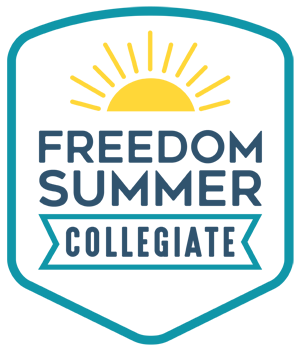Writing a Syllabus for Freedom Summer Collegiate
by Marc Aidinoff, "Technology & Identity" at the Rosedale Freedom Project
As I get ready to return to the Rosedale Freedom Project next summer, it is time again to make a syllabus. In many ways, the task does not get much easier-- it is always an equally exciting and frustrating challenge to cram your favorite ideas into four weeks. Still, in addition to guidance from the Freedom Summer Collegiate team, there are a few things I wish I knew last year:
1) Lead with the big ideas: These courses are so fun to teach because you have the opportunity to teach the most exciting ideas from your field. Often these ideas are so foundational you have forgotten how much they structure your whole way of thinking in the world. It sounds hokey, but it is great ideas that get students hooked. Students can feel the passion from the instructors.
2) Don’t get stuck on the canon: At the same time, you are not offering a first-year college survey course. Leave out the parts of the traditional cannon you don’t like. You are also not intervening in an existing academic conversation. So instead of critiquing the canon, create a new and improved foundation for students.
3) Have something to say: Think about where you want the students to be at the end of each week. What is the argument the syllabus is making? It took me awhile to stop thinking in terms of scholarly arguments and start thinking in terms of arguments students would take with them.
4) Mix-up the modes of instruction: Different students learn differently. One of the best ways to prepare for the summer is to think about different methods of teaching (worksheets, activities, debates) so that the instruction does not bias students who learn like you.
5) Choose texts as a teaching tool, not as the only way to learn: For every text I taught, I had a few additional texts in my head. Just because an author is brilliant, does not mean a close reading is necessary. Often you can summarize and contextualize effectively, so the class can focus on one page or one paragraph. (For my syllabus, I listed longer readings but chose much shorter excerpts for the course pack.)
6) Know what you want to learn: I found it helpful to be explicit about what I was trying to learn over the summer. My students helped me read foundational texts in a far less cynical manner than the one I had developed as a grad student. I picked a few ideas to discuss that would be helpful for my own dissertation if we all talked through together.
7) Stay flexible: A good syllabus is like an accordion, where you feel comfortable stretching out the material students struggle with and speeding through what they get right away.
8) Enjoy it and have fun while you design the class!
